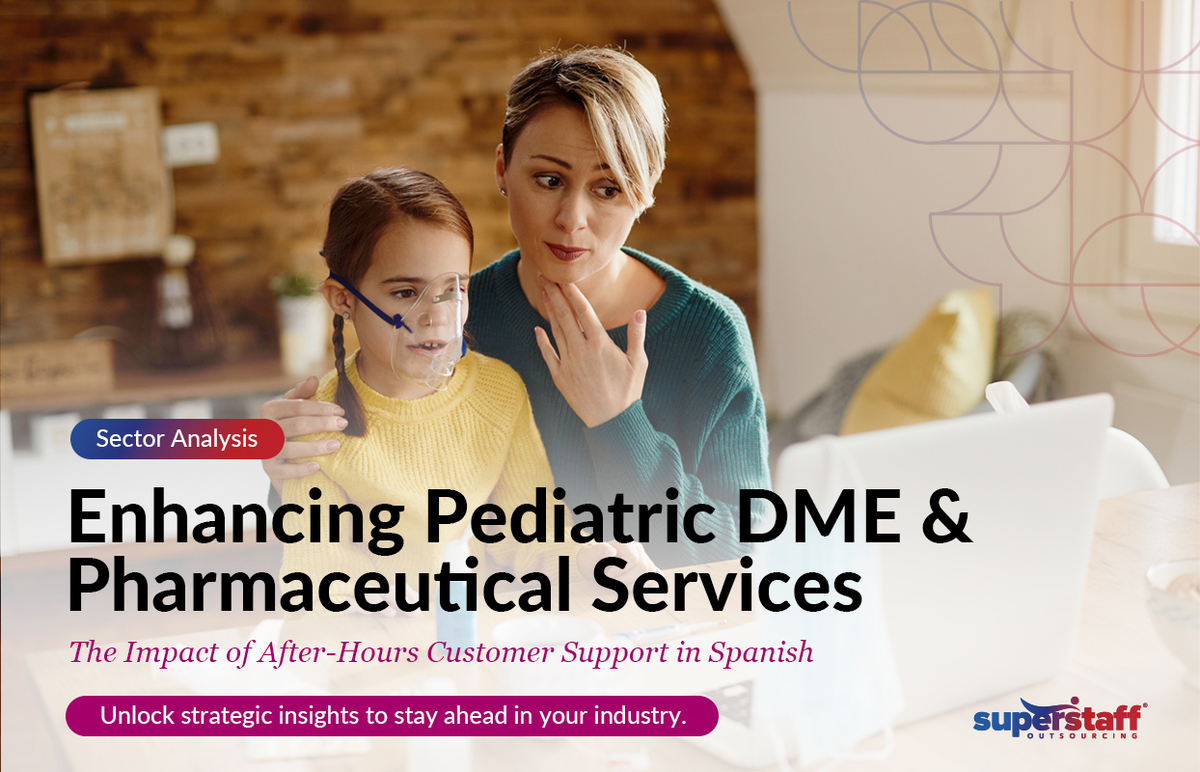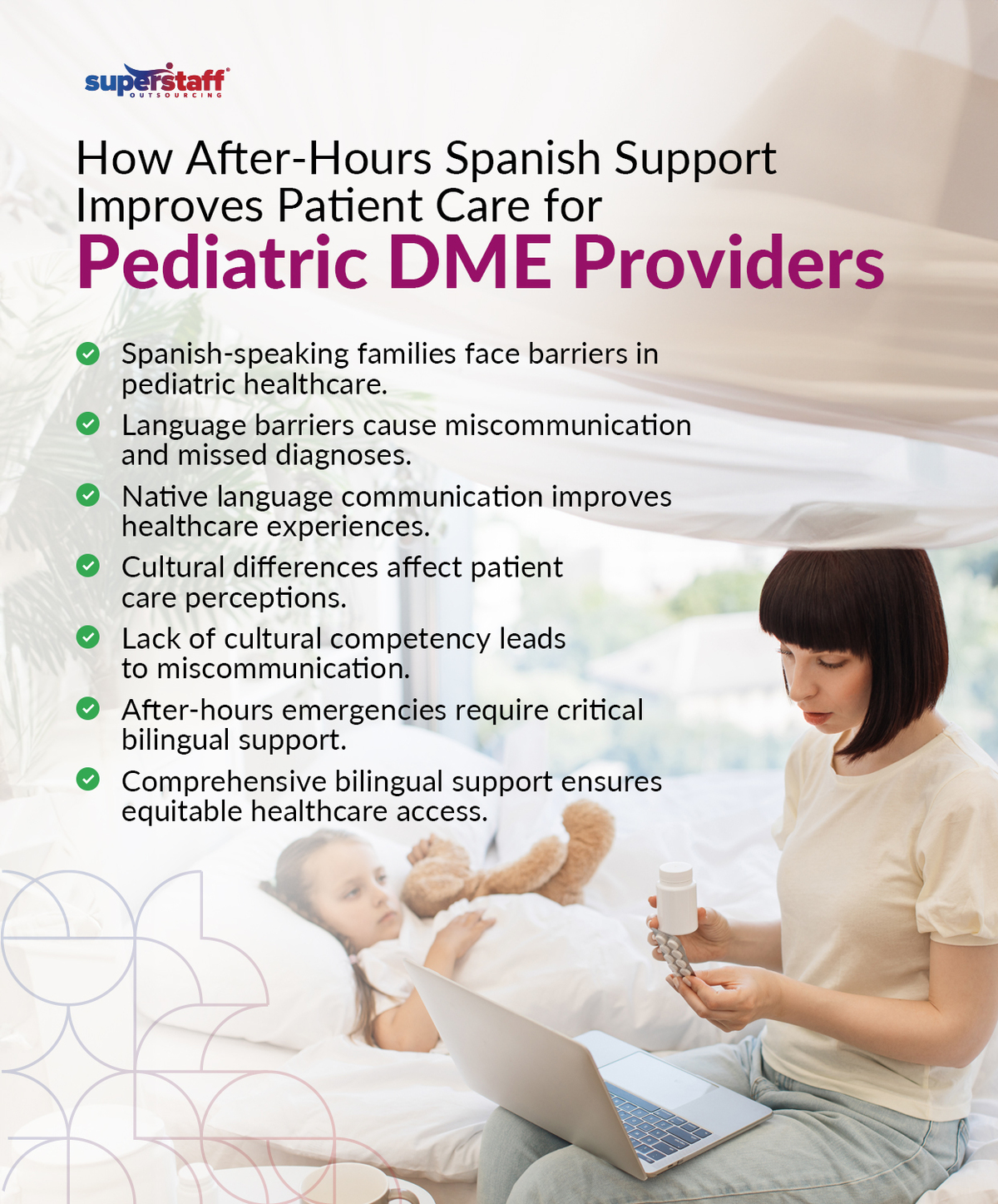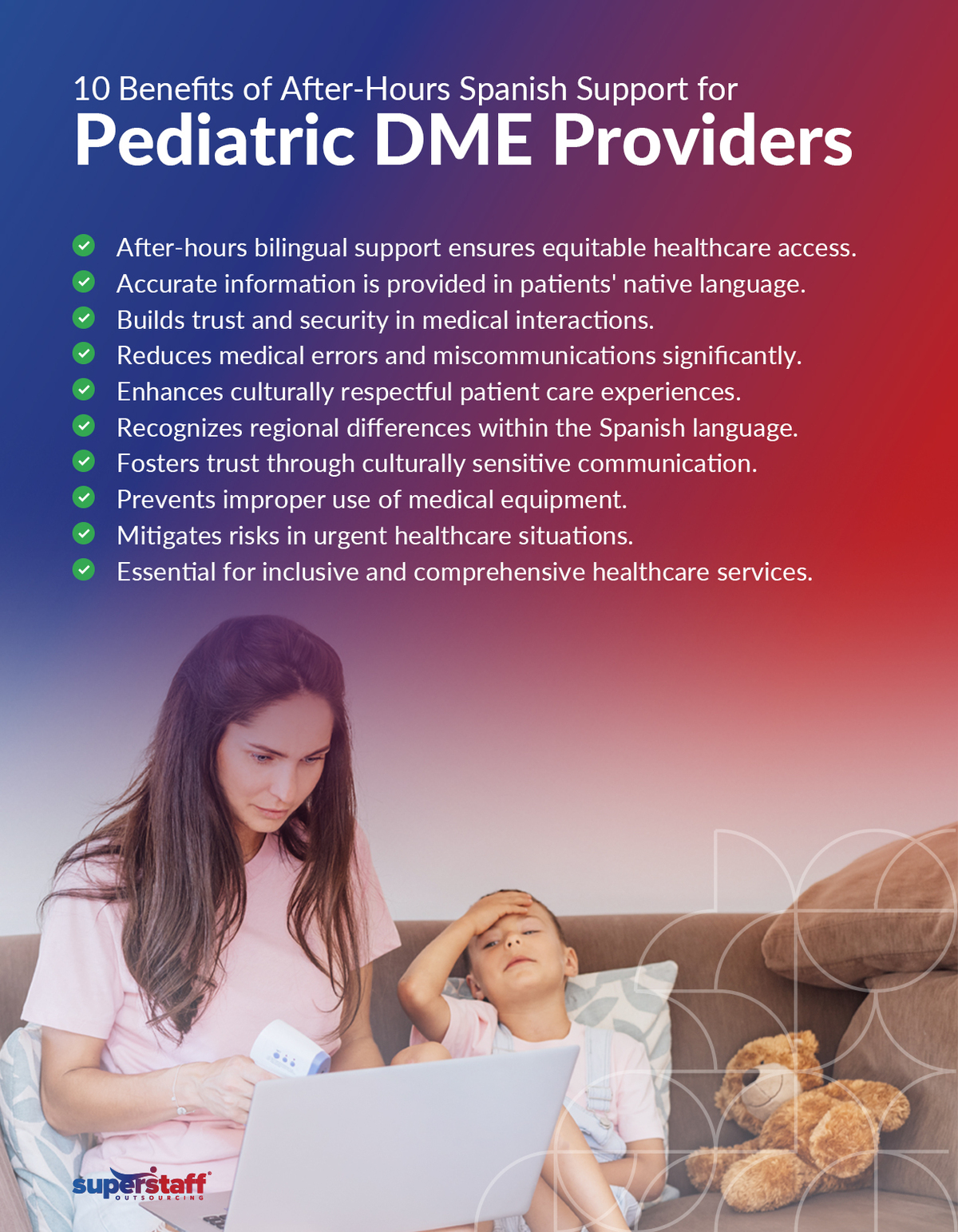
Imagine this: a worried parent desperate for medical equipment in the middle of the night finally finds peace of mind because they’re understood in their native language.
Pediatric Durable Medical Equipment (DME) and pharmaceutical services are essential for children’s health. Timely support is even more critical for Spanish-speaking families.
Offering after-hours customer support in Spanish improves accessibility and communication for your Spanish-speaking customers. This article explores how after-hours bilingual support can significantly impact pediatric DME and pharmaceutical services for Spanish-speaking families.
Challenges Faced by Spanish-Speaking Families in Accessing Pediatric DME and Pharmaceutical Services
Spanish-speaking families frequently encounter significant barriers when accessing pediatric healthcare, particularly in areas like Durable Medical Equipment (DME) and pharmaceutical services. These challenges often stem from language barriers, cultural differences, and lacking bilingual customer support, especially after hours.
Understanding these roadblocks is essential to improving healthcare access and outcomes for this population.

Language Barriers and Their Impact on Patient Care
Language barriers are one of the most prominent challenges affecting healthcare outcomes for Spanish-speaking families. In a case study, patients with limited English proficiency often reported receiving lower-quality care than native English speakers.
This perception is not just about language; it’s about communicating effectively with healthcare providers, which is critical in delivering accurate diagnoses, appropriate treatments, and comprehensive care.
When patients can communicate in their first language, they often report a significantly better healthcare experience. This is because they feel understood and can express their symptoms, concerns, and needs more accurately. Effective communication is especially crucial in pediatric care, where parents must convey their child’s symptoms and medical history to ensure proper treatment.
Consider a real-life scenario where a Spanish-speaking mother seeks help for her child’s persistent cough. She visits a clinic where the staff primarily speaks English.
Despite her efforts to use a bilingual dictionary and describe her child’s symptoms, she struggled to communicate effectively. Without an interpreter available, the mother left the clinic feeling frustrated and uncertain about the care her child received.
This example highlights the difficulty Spanish-speaking patients have when seeking help without adequate language support. In cases like this, the lack of clear communication can lead to missed diagnoses, inappropriate treatments, and distrust in the healthcare system.
Language barriers also extend to accessing DME and pharmaceutical services. For instance, when a Spanish-speaking family needs to obtain medical equipment for their child, they may struggle to understand instructions for use, maintenance, or even the process of obtaining the equipment through insurance.
Similarly, filling prescriptions can become daunting if the instructions and potential side effects are not provided in a language the family understands. This can lead to medication errors, improper use of equipment, and overall poorer health outcomes for the child.
Cultural Differences and Their Influence on Healthcare Interactions
Cultural differences are crucial in shaping healthcare interactions between patients and providers. These differences go beyond just language; they encompass values, beliefs, and practices that profoundly influence how patients perceive care.
Research shows that patients feel more respected and valued when healthcare providers speak their preferred language, which fosters trust and improves communication. However, cultural differences can have a broader impact on a patient’s healthcare experience and satisfaction.
For example, in some cultures, patients may prefer traditional remedies before seeking conventional medical treatments. If healthcare providers are unaware of or dismissive of these practices, patients may feel misunderstood or reluctant to share important information about their health.
That situation can lead to miscommunication, delayed treatments, or even non-compliance with medical advice. Conversely, when healthcare providers demonstrate cultural competency — by understanding and respecting these cultural practices — they can build stronger relationships with patients, leading to better health outcomes.
Patients with chronic conditions or diseases often require ongoing and specialized medical attention. In such cases, cultural competency becomes even more critical.
Providers not culturally aware may unintentionally overlook essential aspects of a patient’s care, such as dietary restrictions, familial decision-making processes, or health beliefs that influence how patients manage their condition. This lack of cultural awareness can result in a higher risk of adverse health outcomes and decreased patient satisfaction.
Moreover, cultural differences can affect how patients interact with the healthcare system. Some cultures value family involvement in medical decisions, while others prioritize individual autonomy.
Understanding these nuances allows healthcare providers to tailor their approach, ensuring patients feel supported and respected in their care journey. By recognizing and addressing cultural differences, healthcare providers can reduce the risk of health disparities and enhance the quality of care for diverse patient populations.
The Lack of Available Bilingual Support During After-Hours Emergencies
The absence of bilingual customer support during after-hours emergencies presents a significant challenge to Spanish-speaking patients and their families. Emergencies don’t adhere to business hours, and when they arise, the ability to communicate effectively with healthcare providers can mean the difference between life and death.
Let’s explore this issue by drawing a parallel with a natural disaster scenario, such as Hurricane Katrina.
When Hurricane Katrina struck, the impact on Spanish-speaking communities was particularly severe. Much of the emergency information, including evacuation orders, was broadcast in English.
This language barrier resulted in delayed or missed evacuation opportunities for those who were not primary English speakers, leaving them more vulnerable to the storm’s devastating effects. This tragic situation underscores how critical language accessibility is during emergencies.
In healthcare, the consequences of a language barrier can be just as dire.
Imagine a Spanish-speaking parent whose child suddenly experiences a severe asthma attack late at night. The parent needs immediate guidance on administering medication and determining whether to take the child to the emergency room.
If they call a healthcare provider and are met with only English-speaking staff, they may struggle to communicate the severity of the situation or misunderstand the instructions provided. This lack of bilingual support can lead to delays in care, improper treatment, and, in the worst cases, life-threatening outcomes.
The importance of bilingual support extends beyond natural disasters to everyday healthcare emergencies. After-hours situations often involve heightened anxiety and urgency, making clear communication even more essential.
Spanish-speaking patients who cannot access services in their native language during these critical moments are left at a significant disadvantage. They may avoid seeking help altogether due to fear of miscommunication, leading to worsening health conditions.
Moreover, the lack of after-hours bilingual support can create a sense of isolation and helplessness among Spanish-speaking families. When they cannot communicate effectively with healthcare providers, they may feel that their needs are not being taken seriously, leading to a loss of trust in the healthcare system. This erosion of confidence can have long-term consequences, as families may be less likely to seek preventive care or follow-up appointments, further exacerbating health disparities.
Healthcare providers must recognize the crucial role that after-hours bilingual support plays in ensuring equitable care for all patients. It’s not enough to offer bilingual services during regular office hours; comprehensive support must be available whenever patients need it, including during nights, weekends, and holidays. This support should include bilingual staff and easily accessible resources, such as translated medical instructions, emergency contact information, and culturally sensitive care protocols.
The Role of After-Hours Customer Support in Spanish

After-hours Spanish bilingual customer support is an added convenience and essential in ensuring equitable healthcare access and enhancing communication for Spanish-speaking families. This support is critical in delivering accurate information, fostering a culturally respectful patient experience, and minimizing the risk of medical errors and misunderstandings.
Let’s delve deeper into these critical functions.
Providing Clear and Accurate Information in the Native Language
Communication in one’s native language is invaluable, especially in healthcare. Spanish-speaking customer support agents are fluent in the language and the subtleties of communication that ensure information is conveyed precisely and empathetically.
Patients who receive information in their first language experience a sense of security and trust. This is particularly crucial in medical contexts, where clarity can directly impact health outcomes.
Ensuring patients can express concerns, ask questions, and understand responses without fear of miscommunication enhances their overall experience. Moreover, transparency in these exchanges reduces the likelihood of errors in diagnosis, treatment, and the use of medical equipment. This level of communication is foundational in creating a healthcare environment where patients feel heard and cared for.
Enhancing the Patient Experience by Offering Culturally Competent Care
Cultural competence is more than just a buzzword; it is a cornerstone of adequate healthcare. Spanish-speaking patients bring a rich tapestry of cultural beliefs and practices that influence how they perceive and engage with medical care.
Culturally competent bilingual support recognizes these nuances, making the healthcare experience more personal and respectful. For instance, understanding that Spanish is spoken differently across regions is not just about language proficiency — it’s about appreciating the diversity within the language itself and responding accordingly.
This cultural sensitivity allows customer support agents to build trust and rapport, essential for a positive healthcare experience. By integrating cultural awareness into patient interactions, healthcare providers can offer care that is not only medically sound but also aligned with the patient’s values and expectations. This approach fosters a more inclusive healthcare system where patients feel respected and understood.
Reducing Misunderstandings and Errors in Medical Advice and Equipment Usage
Language barriers are a significant source of medical errors, often with severe consequences. The case study referenced earlier starkly illustrates the dangers of miscommunication in healthcare.
A patient, unable to communicate in the hospital’s primary language, experienced complications after surgery due to a communication breakdown. The delay in addressing these complications, exacerbated by inadequate translation, highlights the critical need for bilingual support.
Bilingual customer support agents are trained to mitigate such risks by ensuring that medical advice is accurately conveyed and understood. They serve as a bridge between patients and healthcare providers, translating not just words but the meaning and intent behind them.
In doing so, they help prevent the miscommunications that can lead to improper use of medical equipment or misunderstandings of medical instructions. In urgent situations, where every moment counts, this level of support can be life-saving.






